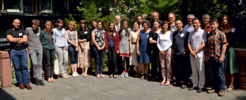
Realising Eurasia:
Civilisation and Moral Economy in the 21st Century
Research Locations

2 - Sylvia Terpe, Senior Research Fellow
3 - Luca Szücs, PhD Candidate
4 - Daria Tereshina, PhD Candidate
5 - Ceren Deniz, PhD Candidate
6 - Sudeshna Chaki, PhD Candidate
7 - Laura Hornig, PhD Candidate
8 - Lizhou Hao, PhD Candidate
Projects
Field research pictures
REALEURASIA
The project “Realising Eurasia: civilisation and moral economy in the 21st century” (REALEURASIA) was launched on 1st July 2014 and completed in July 2020. Seven Ph.D. students spent the academic year 2015-6 carrying out field research in cities of modest size located across Eurasia. Three post-doctoral researchers, the project coordinator and project leader also carried out field research. Five dissertations were submitted by summer 2020 and a sixth followed one year later. For personal reasons, the project of Lizhou Hao in China could not be completed..
In this project Eurasia was understood in the classical sense of global historians as the super-continent which embraces the whole of Europe (including the Mediterranean world) and the whole of Asia (Hann 2016). The project was primarily rooted in the theories and methods of economic anthropology, but it also set out to renew links to historical sociology and adjacent fields. The framework was "civilisation" in the universal spirit of Marcel Mauss, with Eurasia-specific inflections drawn primarily from Max Weber’s work on the “world religions” (Hann 2017). The research team adapted the concepts of moral economy (Thompson) and Wirtschaftsethik (Weber) in order to operationalize them both at multiple levels within the civilisational frame. The project thus combined detailed ethnographic investigations of family businesses, in towns selected to ensure structural comparability, with attention to the embeddedness of economy in religion, polity, and society as they have evolved together in the longue durée of the Eurasian past.
The project was constructed so as to contribute to various sub-fields of anthropology, while also engaging with long-running debates about modernity and global history. Our investigations of contemporary economic behaviour revealed common dilemmas, rather than any clear divide between the European settings and the countries investigated in Asia. This "negative" result was construed as support for the views of anthropologist Jack Goody and numerous global historians who have approached “Christian Europe” as an important macro-region of the Eurasian landmass, rather than as a distinct continent. There is no need to belittle crucial developments in Europe, but the recent rise of East Asia is a timely reminder that the most powerful civilizations of this landmass have common origins dating back to the Bronze Age. Goody’s perspective on three millennia of Eurasian history can be productively combined with Karl Polanyi’s analysis of the transformations of the last three centuries (Hann 2018a).
The project exemplified how such macro-level interpretations can be productively combined with ethnographic research. Critical of over-simplified usage of “moral economy”, Hann drew on his own long-term research in Hungary (extended in a new local setting within the frame of this project) to highlight the salience of human labour (work) for grasping the moral dimension (2018b). Little direct evidence was found to support the links postulated by Weber between economic performance and religion, but all team members collected abundant materials showing that economic action is profoundly influenced by evolved values and that the toolkit of Max Weber remains useful (Terpe 2018). The edited volume Moral Economy at Work (Yalçın-Heckmann 2022) illustrated how moral ideas embedded in history and culture shape relations between employers and employees, and how concepts of class are complicated by differentiation according to ties of family and kinship, neighbourhood, ethnicity, religion, caste, etc. Further aspects of value-oriented economic actions were explored in papers by Hann (2021), Terpe (2021) and Rajković (2021), and in all six completed doctoral dissertations (for further information see Halle Studies in the Anthropology of Eurasia).














